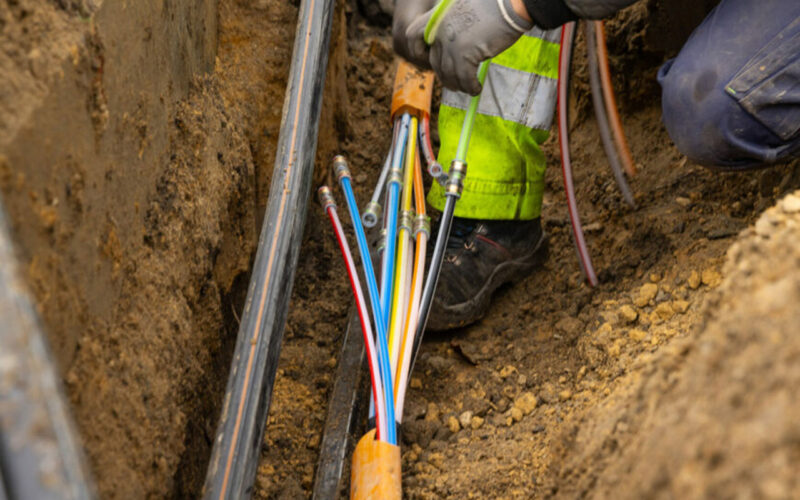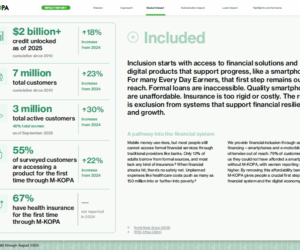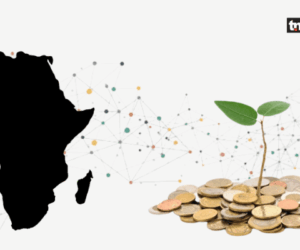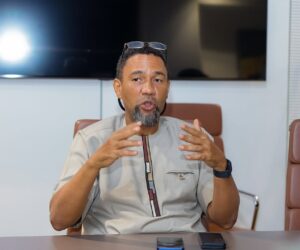Telecoms company, MTN Nigeria, announced that it suffered 760 fibre cuts nationwide in July 2025. That brings its total year-to-date tally to over 5,478 incidents. These disruptions have continued to impact service quality across the country.
At the end of June 2025, MTN had suffered 4,700 cuts, bringing the total to about 13,700 incidents in 18 months. A breakdown of the incidents by zone showed that about 2,500 cuts occurred in northern Nigeria, 2,800 in the south-west, while 3,500 were recorded in the south-east and south-south regions combined.
The telco’s Chief Technical Officer (CTO), Yahaya Ibrahim, explained that sabotage (vandalism) and road construction account for 69% of total fibre cuts across the country.
He added that while instances are replete across the country, states in the South-East and South-South region are the country’s hotspots for Fibre and network site vandalism. “Akwa Ibom, Abia, and Rivers stand out in the states. While in specific locations, Omoku and Egbema stand out for fibre vandalisation”, he explained.
In effect, this has resulted in downtimes of about 15 hours a month. One such case of vandalism in the North-Eastern region was addressed through a maintenance exercise yesterday, August 24th. The activity affected 101 sites across 15 LGAs in Kano, Adamawa, and Borno States.
According to a statement by its spokesperson, Lakinbofa Goodluck, the maintenance work will restore a damaged fibre infrastructure along the AFCOT–Bawo Village route in Adamawa state by routing traffic to a newly installed fibre infrastructure. “This upgrade is necessary to eliminate damaged fibre spans and improve overall network stability”, the statement explained.

Fibre cuts: MTN, Glo, Airtel and 9Mobile alike
Service disruption is a recurring challenge in the Nigerian telecoms industry.
Data from the Nigerian Communications Commission (NCC)’s live incident portal revealed that telecommunication services were severely disrupted in at least nine states (Rivers, Katsina, Lagos, Enugu, Benue, Anambra, Imo, Abia, and Akwa Ibom) across Nigeria in June 2025, following multiple incidents of fibre cuts.
The portal provides a real-time view into service disruptions and response times, offering a level of transparency that industry analysts say is long overdue. It indicates that fibre cuts accounted for seven out of the nine recorded incidents during the period under review, affecting a range of services including voice calls, SMS, USSD, and mobile data.
The data showed that the disruptions affected major operators, including Airtel, MTN, 9Mobile, and Globacom.
Of the lot, Airtel was among the worst-affected providers. It suffered three fibre cut incidents between June 1 and 5. The first occurred on June 1 in Rivers State, disrupting data services in Degema, Obio-Akpor, and Port Harcourt for two hours and 44 minutes.
Another disruption occurred the following day in the same locations, lasting one hour and 29 minutes. On June 5, the company reported another outage due to fibre failure in Anambra and Imo States, including areas such as Ideato North, Owerri Municipal, and Owerri West. The incident lasted one hour and nine minutes and affected all service types, including USSD and SMS.
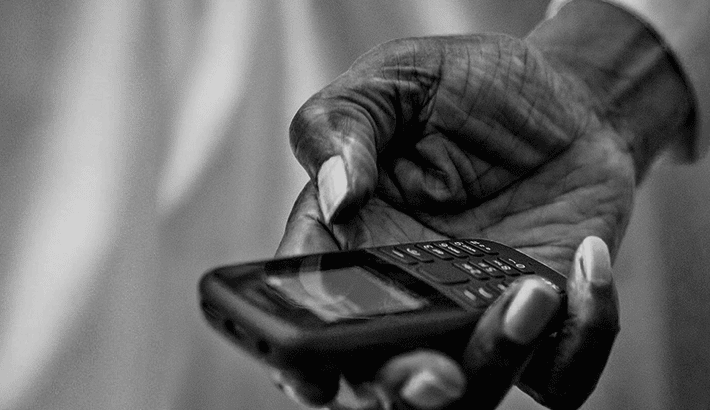

The telecoms company’s latest disruption occurred in Zamfara on July 7 in Anka, Bakura, Birnin Magaji/Kiyaw, Bukkuyum, Bungudu, Gummi, Gusau, Kaura-Namoda, Maradun, Maru, Shinkafi, Talata-Mafara, Tsafe, Zurmi, affecting SMS, Voice and Data services
9Mobile also recorded two major fibre cuts within the same period. On June 1, a disruption in Katsina affected 11 local government areas, including Daura, Funtua, and Dutsin Ma. The outage, which lasted for one hour and 23 minutes, impacted all service channels. Another incident on June 2 in Lagos caused significant disruptions in several commercial districts, including Apapa, Lagos Island, Mushin, and Surulere. The outage, which lasted four hours and 20 minutes, was the longest recorded during the week.
MTN also experienced a fibre cut in Benue State and several local councils in Enugu State within the same period. Areas such as Nsukka, Udi, Isi Uzo, and Igbo Eze South experienced service interruptions for 52 minutes. According to the live report, SMS, voice, and data services were affected.
The leading telecoms company also reported a power outage that impacted service delivery in parts of Borno and Gombe states. Areas affected included Maiduguri, Gombe, Biu, Dukku, and Yamaltu/Deba. The power failure, which lasted 42 minutes, affected SMS, voice, and data connectivity.
Similarly, Globacom suffered a fibre cut on June 5 that disrupted services in Abia, Akwa Ibom, Imo, and Rivers, including Aba North, Umuahia South, and Okigwe. The incident lasted 46 minutes. However, the disruptions were not limited to fibre cuts.
Three days before, Glo reported that acts of vandalism had disrupted telecom services in Enugu State and the Federal Capital Territory. That incident affected users in Enugu East, Enugu North, and Enugu South for two hours and eight minutes.
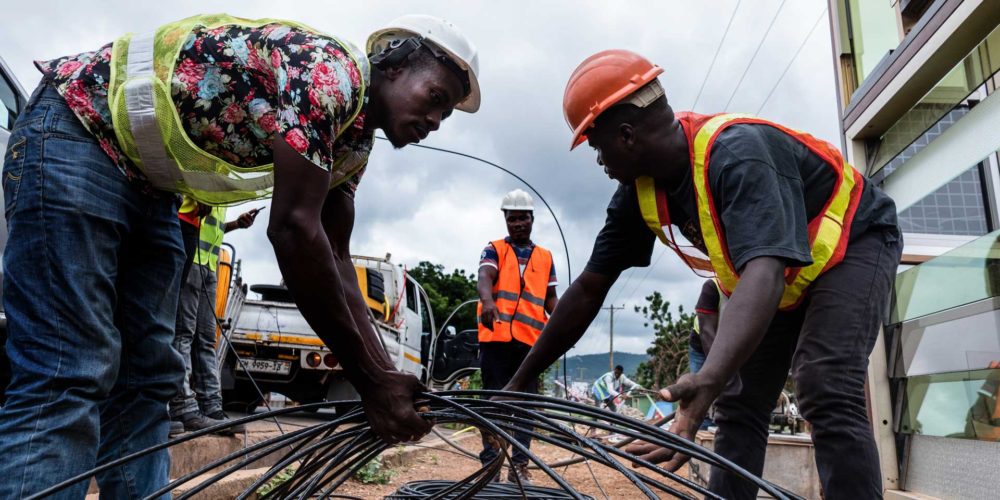

Seeking a lasting solution: CNI enforcement
Notably, broadband fibre optic cables are at the core of modern communication infrastructure. They enable the high-speed data transmission that drives a wide range of social and economic activities. Hence, ensuring zero downtime is a priority for all players.
Bloomberg reports that repairs and revenue losses from damaged cables cost Nigerian telecom players about N27bn ($23m) in 2023. MTN alone reported that it relocated 2,500 kilometres (1,553 miles) of vulnerable fibre cables between 2022 and 2023, spending over N11bn.
That sum is sufficient to build over 870 kilometres of new fibre lines in uncovered areas.
To solve this challenge efficiently and affordably, MTN plans to deploy artificial intelligence (AI) technology in collaboration with Huawei Technologies to monitor and protect its fibre optic cables nationwide. The technology will detect vibrations, identify the cause, and alert relevant personnel for swift response within minutes.
But there is so much that technology can do when the human factor is left unaddressed.
On its part, the Nigerian government has shown an early commitment to solving the problems. In July 2024, President Bola Ahmed Tinubu signed a presidential order that designates all telecommunications infrastructure as critical national information infrastructure (CNI).


The CNI is designed to protect 13 key sectors and systems deemed vital for the functioning of the nation’s economy, security, public health, and general safety under the “Designation and Protection of Critical National Information Infrastructure Order, 2024,” signed by the President.
The primary objective of this designation is to develop cohesive and proactive measures to secure and protect these critical systems from disruption, attacks, or tampering, ensuring their continuous and effective operation by the Office of the National Security Adviser (ONSA).
Although enforcement has stalled, the move criminalises the destruction of telecoms infrastructure, stipulating a 10-year jail term for culprits. It also prohibits governments from damaging telecoms infrastructure without a court order.
However, Ibrahim admitted that the policy has led to tangible gains in terms of infrastructure protection. “Progress is being made as this is still new, but interventions are in progress to fully operationalise the law,” he said.
He stressed the need for more education and collaboration in the practical enforcement of the CNI designation for telecom infrastructure. “First, we need to educate ourselves on the importance of telecommunication services to Nigerians, how our economic, social, political and security activities are dependent on telecommunications. This is how critical connectivity has become to Nigerians,” he added.
The best time to intensify the efforts is now.

